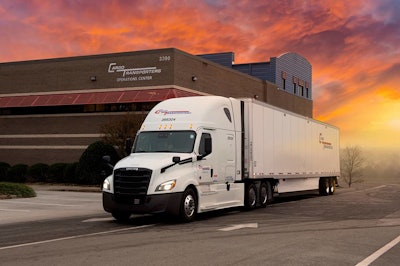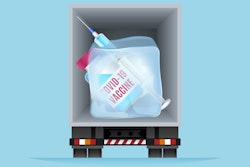Trucking's elevated social status, however, didn't translate when a coronavirus vaccine became available in December, as transportation employees that didn't meet certain age or preexisting condition guidelines were mostly relegated to the third wave of vaccination eligibility. In some states, drivers and fleet employees still aren't eligible. A handful of others have just recently entered into their third phase. Mississippi this week joined Alaska's as only the second state to open vaccination appointments to all residents 16 years and older.
Many states require proof of residency in order to be inoculated there, and varying eligibility criteria in the states that don't complicates matters for drivers who may seldom return to their home state, yet may or may not be eligible in any of the states through which they drive.
To streamline the effort, National Association of Truck Stop Operators (NATSO) President and CEO Lisa Mullings has called on the Centers for Disease Control (CDC) to designate truck stops and travel plazas as mobile vaccination sites for the distribution of COVID vaccines to truck drivers and truck stop employees, regardless of where they live.
[Related: Truck inspections expected to rebound in 2021 following sagging 2020]
Holding vaccination clinics at truck stops, specifically trucks stops that already have medical clinics said JKC Trucking Vice President Mike Kucharski, "would be a step in the right direction."
 Cargo Transporters, based in Claremont, North Carolina, has worked directly with the Catawba Valley Health System to get drivers and employees vaccinated.
Cargo Transporters, based in Claremont, North Carolina, has worked directly with the Catawba Valley Health System to get drivers and employees vaccinated.
Making shots available at truckstops is not simply a matter of convenience said American Trucking Associations Vice President of Safety Policy Dan Horvath. It's a logistical matter, as it would alleviate concerns of routing drivers back through home domiciles for followup vaccinations. Executive Director of the St. Christopher Relief Fund Donna Kennedy said her group is currently working with pharmacies and NATSO to develop a plan to roll out vaccine clinics at travel centers nationwide.
Cargo Transporters, a Claremont, North Carolina-based truckload dry freight carrier with a fleet of 501 trucks and 1,700 trailers, has taken matters into its own hands. The Tarheel State reached its third wave of vaccine eligibility earlier this month, and the company is working directly with the Catawba Valley Health System to get its drivers and employees vaccinated. To-date, Cargo Transporters Vice President of Human Resources Kristy Hedrick said approximately 120 drivers and staff have received their first shot.
Cargo Transporters was one the first employers in the state jump on such a partnership.
The carrier's allotted two weekly vaccination days are Monday and Thursday, and the company has a target of 250 employee vaccinations. Hedrick expects to be just a little more than halfway to its goal at roughly 150 come Monday, and doesn't plan to stop just because it's hit the 250 benchmark.
"Once you arrive onsite, you're looking at basically a 5 to 10 minute process, then you're sitting for your monitoring time, At most, you should expect 30 minutes for any given appointment." Kristy Hedrick, Cargo Transporters vice president of human resources.
"That's going to continue as a process until we get everyone who has a desire to be vaccinated, [we ]give them that chance," she said.
"Streamlining" the appointment vaccination for her employees, as Hedrick called it, has paid off. In many cases she said drivers have found they were able to get the vaccine faster by working through Cargo Transporters than standing in line with the general public.
"A lot of what we're hearing is, 'I've been on a list,' even if they were eligible in one of the previous groups," she said. "'I've been on this list. I haven't got a call. You're the first one and the first opportunity that I've had to get that vaccination.' They have jumped on board with it."
The State of Illinois will make vaccines available to its third wave March 29, and Kucharski said his Chicago-area reefer carrier is still waiting to get the call to schedule onsite COVID vaccinations done at its main office. In the meantime JKC has been "providing proper documents to drivers and employees and sending them to Loyola Hospital down the street to schedule vaccination."
Cargo Transporters will also work with its employees to arrange transportation to the offsite clinics: three temporary tents in the parking lot of a local hospital approximately seven miles from the terminal.
Participation in the program is voluntary, and there is no financial incentive.
"It's an individual choice and they are able to make that choice themselves," she said, noting that most of the employees who decline vaccinations cite various reasons, including potential reactions. "We encourage that they talk to their [healthcare] providers, that way they are better educated, visit the CDC [website], use those resources, learn about the vaccinations and make a wise choice based on the information that you find."
Similarly, Kucharski said JKC Trucking has not incentivized vaccination, leaving the decision on wether to receive a vaccine with its employees. "We have not encouraged drivers to get vaccinated as the greater majority want to get vaccinated," he said, "and we are providing drivers the info to schedule vaccination locally until we can provide onsite vaccination. Employees are also allowed to leave work and get vaccinated if they have an appointment during work hours."
The vaccination process isn't all that time consuming, Hedrick noted – welcome news for a industry beholden to uptime.
"Once you arrive onsite, you're looking at basically a 5 to 10 minute process, then you're sitting for your monitoring time," she said of the 15 to 20 minute wait to ensure the patient doesn't have an adverse reaction to the injection. "At most, you should expect 30 minutes for any given appointment."
Appointments for the second vaccine are generally scheduled at the same time as the first, but there is some flexibility for drivers who are delayed or otherwise unable to make their scheduled follow-ups.
"The first one, most of those have went pretty smooth, so the second one, we'll see how that goes," Hedrick laughed, "but we know that a lot of drivers have routine ... They typically know that they go out on a Sunday, they're usually back in on Thursday ... so I think we'll fall in line pretty well on our second vaccination."












